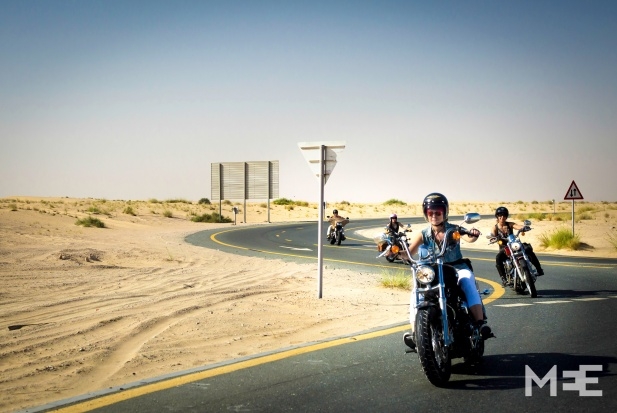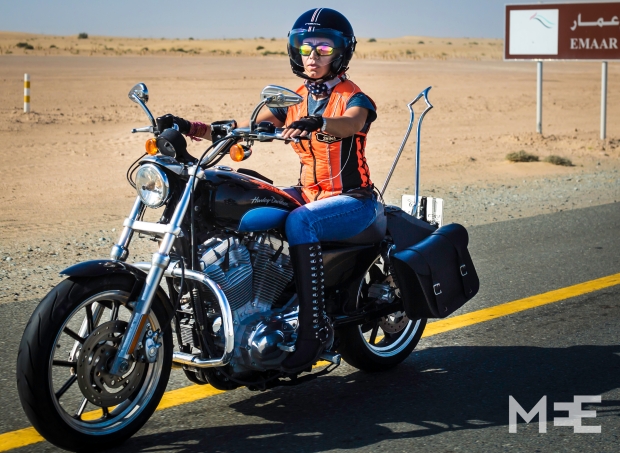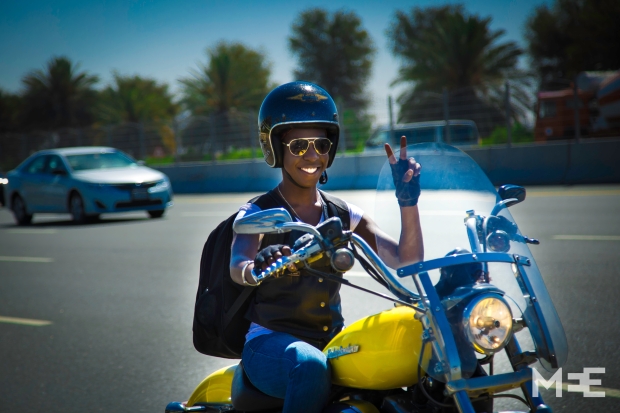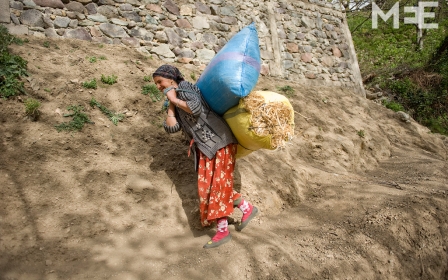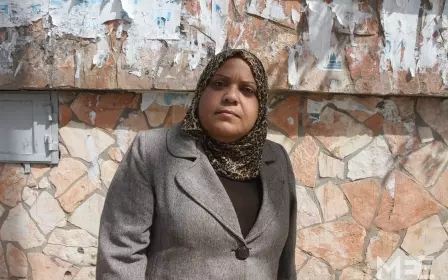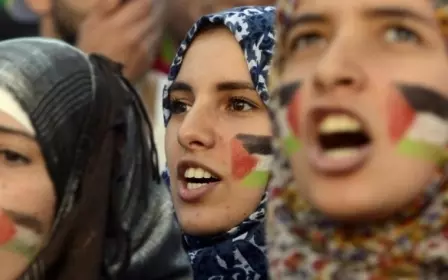Taking back the reins: Dubai’s female bikers in control
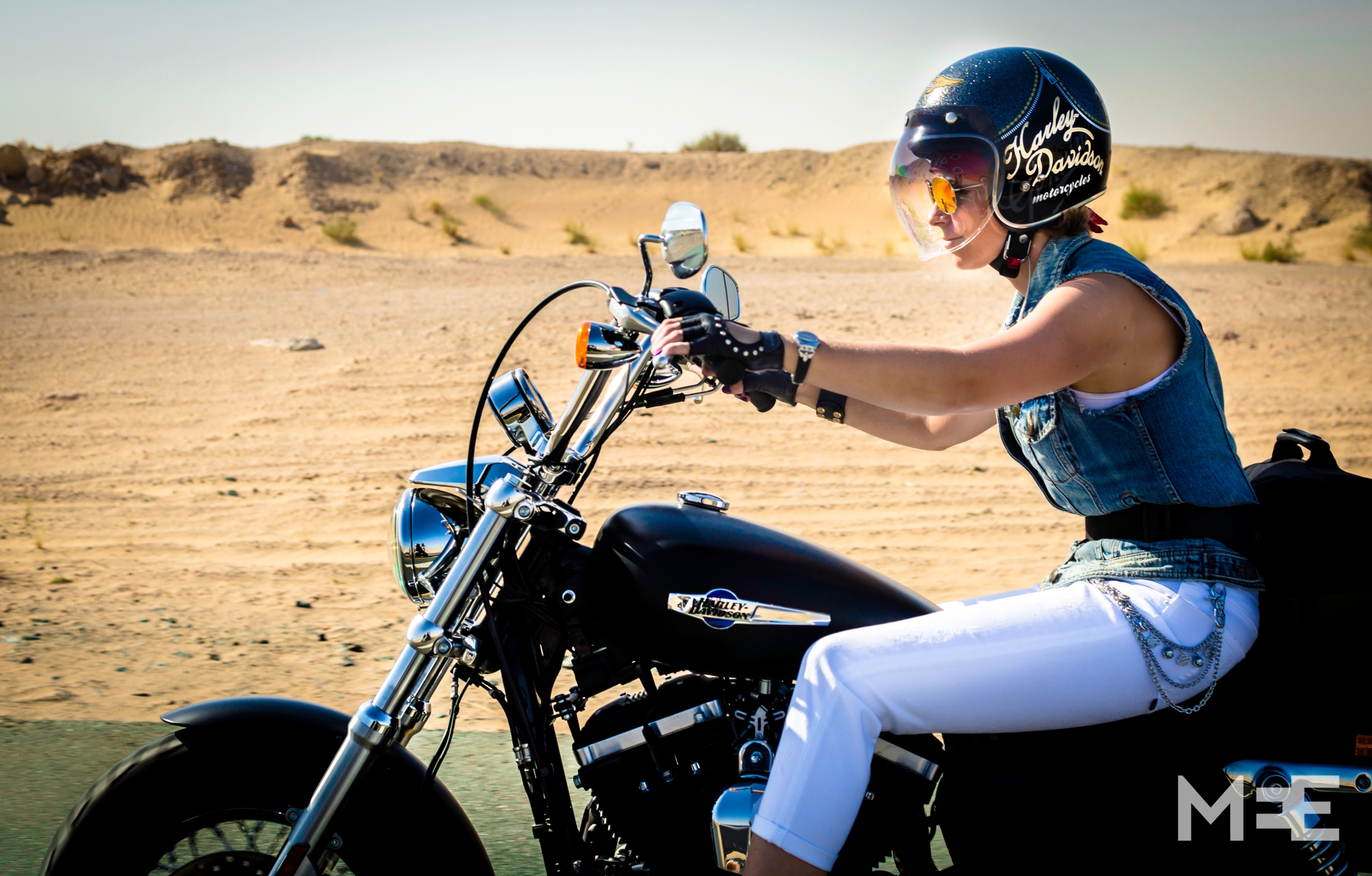
Dana Adam* is from a powerful conservative family in Yemen, where women invariably wear hijabs, don’t drive and need their husband’s permission to leave the house.
But aged 32, the Dubai-based mother-of-two learned to ride a motorbike - and not just any motorbike, but a Harley Davidson.
What possessed her? Her answer is disarmingly frank.
“Because I was depressed. Really depressed, since 2000,” she answers with sincerity.
What follows is a sad story about her husband’s inveterate infidelity, unreliable business partners and deep-seated loneliness in her adopted home of 14 years.
“I found out when I was pregnant that my husband spent my honeymoon with his ex,” she says in perfect English.
Adam is educated and privileged, and evidently very different to the average Yemeni woman on the street, where illiteracy stands at 70 percent But she has had a stormy, disruptive marriage.
After the turbulent relationship that produced a son, 13, and daughter, seven, Adam is now separated. But that is something she refuses – along with her motorcycling habit – to share with her traditional parents.
It would be hard, given the fight the perennially strong-willed daughter put up when she married her ex. She had been due to marry a cousin, but argued with her father.
“I told him if you don’t let me marry this guy, I won’t marry at all," she says.
“I don’t care about people, what they may think about me. I don’t do a lot of things because I don’t want to bother my family, that’s it. My family are the only thing I’m concerned about," Adam says.
So why did she turn to motorbikes to help her through her depression?
The petite, five-foot-nothing beauty claims she has long been a tomboy, spending her youth with male cousins and playing around on a motorcycle that belonged to her father’s bodyguard.
“I was thinking I love bikes, I love Harleys actually, so I just said ‘yalla’ [let’s go]. My husband doesn’t know I have a bike … my kids know, they keep it a secret.”
Adam has been riding for about five months, but is already very confident, performing tricks like standing while she rides – as I learned when I tagged along on a recent outing in honour of International Female Ride Day, on 2 May.
“I’m the one [who is] crazy…even when I got my licence, the man said ‘Oh my God, you’re riding like a man’.”
The Dubai public is generally very welcoming of female riders, she says.
“When they know I’m Arabic and Yemeni, they go crazy … you know, Yemenis cover themselves.”
As the cavalcade passes, arms brandishing smartphones dart out of car windows to snap shots. When we arrive at a small cluster of hole-in-the-wall shops on the backroads somewhere between Dubai and Al Ain for a spot of karak chai, the Pakistani shop assistants in salwar kameezes are momentarily dumbstruck.
Confusion gives way to giggles and they slowly approach the women, camera phones in hand. Soon it’s a fully fledged photo shoot, with the obliging pinups striking jestful poses along the makeshift asphalt runway.
Adam says she longs to be more upfront with her family.
“I don’t think I’m doing anything bad. I pray five times a day, I don’t drink, I don’t have a boyfriend. I’m good," she says.
Life in Dubai has taught her to be strong, and getting her licence and joining the Ladies of Harley Dubai chapter has given her a family away from home, she says.
“They are really good people, good friends who really care about you and watch you all the time. I found happiness with them.”
There are more than 120 women in the group as either riders or pillion passengers, with a core group of about 20 – and growing.
Adam says riding “touches [her] heart”.
“I’m stronger now. When I’m riding I feel free, alive, stronger.”
Shima Mehri is from Iran, where it is illegal for women to ride motorcycles.
“I decided to be a biker when I was only a little girl,” she says.
She lived in Austria until she was 15, where there were “lots of lady bikers”, before returning to Iran with her family.
“I was only 10 and I said to my dad ‘When I grow up I want to be a biker like them.’ He was just laughing and telling me ‘Wait till you grow up and you can make a decision.’”
Mehri stayed in Iran for 14 years, before moving to Dubai.
“This wish has been with me until the time I left Iran. As soon as I reached Dubai, I said ‘Okay, this is the time.’”
She started classes and got her motorcycle licence almost immediately.
That was five years ago now and the 34-year-old has only recently convinced her husband to also get his own licence.
“At the beginning, he was scared a lot but when I joined the group, he was thinking, ‘Okay, it’s so safe here in Dubai to ride.’ Every single ride he is also with us, but he follows in the car.”
Mehri says it is partly good fortune and partly determination that she has an open-minded husband.
“He thinks totally different. It depends on the women, how they convince their husbands. The new generation of men in Iran, they’ve started to think women should have freedom to do what they want," she says.
But she has not been so lucky across the board; she has lost a number of Iranian friends since news travelled that she had become a biker.
“My cousin who lives here saw me [and called my mum]. She said, ‘Your daughter, instead of sitting at home and cooking for her husband, she’s going out riding with the guys and she doesn’t care about her duties at home.’”
And her mother’s attitude towards her little girl biking? Well, it’s an unlikely story.
“I have two younger brothers. Always she used to tell them you are not allowed to ride a bike or smoke … if you grow up and do one of these things you are not my son anymore.”
Still, Mehri decided to front up once she had her licence and motorbike and called to confess. She says, at first, her mother tried to resist the news before grudgingly accepting it.
“The only thing she told me was ‘Please ride safe and take care of yourself.’”
That was five years ago. Last month, she sent her daughter a photo of herself from the 1970s – sitting on a motorbike.
“She called me and said ‘Shima, that day when you said you got your licence, I was really proud of you inside my heart … when I was 18, I had my own bike and I was riding too.’ That was a big secret I didn’t know,” Mehri says.
“Imagine a mum always forbids a kid they are not allowed to ride a bike then you find out your mum was a biker. I was really shocked.”
So why did she hide this news from her daughter?
“It’s because of the culture we have in Iran. After the revolution everything changed, even the ideas of the people.”
But the maths teacher is doing what she can to live her own life with no regrets.
“In the Middle East, most women put themselves under the control of men and they think they can’t do anything without men. [When] they are old - 70, 80 - they are alone, for sure they’ll have a lot of regrets. Life is short and they can’t go back to do whatever they want.”
She is pleased to see many of the female students she teaches now living for today, not worrying about cultural pressures as much as her own generation.
British woman Catherine Hector has been riding for a long time, 10 years.
She has been in Dubai for the past two and a half and is the activities officer for the Ladies of Harley Dubai chapter.
“When I was very small, my family used to watch motor Grand Prix on a Sunday. Every time they used to curl with their knees down on the corner I was like ‘I want to do that’ … I haven’t mastered it yet, but it will be done.”
Hector moved to Dubai by herself in search of adventure. That is something she has certainly found with her fellow riders hailing from all over - Germany, Poland, the US, Iran, Morocco, Russia, Yemen.
“Being in the UK, you just see British people mostly and only a few people from different nationalities,” says the British-Caribbean 32-year-old.
“Here you’ve got over 200 different nationalities and the riders are a very diverse group.”
“He’d always say to me ‘Make sure it doesn’t fall down, park it in reverse’… he used to come out and pray for us as we left," she says.
But she understands there are different cultural norms in this part of the world; some of which are good. The women mostly ride alongside the Harley men, who buck the stereotype of biker gangs, she says.
“They’re very, very respectful guys. A lot of them are like brothers. They’re actually overly protective. Even the ones who are not married are very respectful. They’re not sleazy.”
But some can be overly attentive, she says. This is partly why she organised the Dubai ride for International Female Ride Day, in which about eight women participated.
“There are a couple of guys who don’t think ladies should ride by themselves,” she tells me after the ride is over and the women are relaxing by the pool of one of Dubai’s five-star hotels.
“It was a nice time for the ladies to have a bit of power and do something by themselves. Even though they respect us as riders, they think we’re going to ride 40 kilometres an hour.”
Speeds topped 120km on the two-hour ride, with a woman, Mehri, in the rare position of road captain – though several men tagged along as safety.
“We’ll have you as safety crew, but anything else we don’t really need you,” the IT and marketing manager jokes.
The ride was also calculated to send a global message.
“A lot of people expect Dubai is like Saudi, that the women are very oppressed, they can’t really do much, there’s no freedom, women can’t drive.”
But that is not the case and Hector says a growing number of women are getting into the scene.
“As they’re seeing more ladies part of the group, they think ‘If they can do it, I can definitely do it.'”
---
*Not her real name
New MEE newsletter: Jerusalem Dispatch
Sign up to get the latest insights and analysis on Israel-Palestine, alongside Turkey Unpacked and other MEE newsletters
Middle East Eye delivers independent and unrivalled coverage and analysis of the Middle East, North Africa and beyond. To learn more about republishing this content and the associated fees, please fill out this form. More about MEE can be found here.


